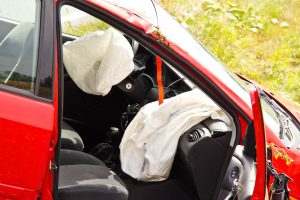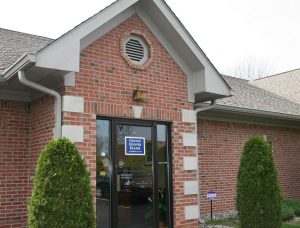
Car Accident Lawyers 317-881-2700
Modern vehicles have an airbag system meant to protect drivers and passengers from sudden impact or ejection. In older model cars and trucks, there is typically only one airbag, and it’s located in the steering wheel or driver’s side dash. Newer model vehicles are more likely to come equipped with driver-side and passenger-side airbags; and others even come with side-cabin airbags, headrest airbags, rear-seat airbags, and more.
There are several crash sensors located all throughout a vehicle that relay instantaneous messages to the airbag control unit when they sense the car’s physical well-being has been damaged. The airbag control unit then responds by initiating airbag deployment. From the moment a vehicle’s crash sensors detect a collision, to the moment the airbags deploy, only a fraction of a second passes by. This entire process from start to finish happens faster than a person can blink an eye.
Airbags are enormously advantageous and revolutionary assets to our society. This is because they provide a soft cushion in the case of a sudden impact or collision, preventing serious head and chest injuries, brain injuries, orthopedic injuries, ejection from vehicles, and more. Although airbags are meant to, and do, save lives, they can also cause minor to moderate injuries; especially if seat belts are not worn.
Airbags are designed to work in conjunction with a vehicle’s safety restraints. Failure to properly restrain oneself in a vehicle can result in more severe airbag injuries or more serious injuries. After being involved in a motor vehicle accident that causes your airbags to deploy, it is best to know what to do next for the safety of yourself and your passengers. Continue reading to learn the proper steps to take after an airbag system deploys in a vehicle.
Airbag Injuries
It is very common for a person to experience an airbag deployment at least once in their lives. For this reason, it is helpful to know how to handle this type of situation in order to reduce anxiety, stress, and shock if it does ever happen. Keep in mind that airbags don’t just deploy in serious car accidents, they can also deploy from minor ones as well. For example, in some vehicles, if the crash sensors detect abrupt and forceful braking, the airbags might deploy. In any case that airbags deploys, here are the steps to take to ensure your safety and security:
Assess Your Health

Car Accident Injury Claims 317-881-2700
Immediately after the airbags deploy and your vehicle has come to a complete stop, the first thing to do is assess your health and the health of any passengers that might be with you. Are you and your passengers conscious? Take a look at all extremities and skin, checking for burns, abrasions, or possible broken bones. Consider the head, neck, back, and spine; how do they feel and do you believe they’re injured? Can you walk? Can you talk? Can you see? Do you feel nauseous?
These are all important considerations for drivers and passengers after an airbag deploys. If you conclude that you are in good health, begin to offer help to other passengers, as well as, any other individuals that were involved in the accident.
Seek Immediate Medical Attention
Even if you and your passengers feel as though everything is fine, sometimes adrenaline or shock can null pain and injury. Also, concussions and head traumas can lie dormant for days before becoming evident. This is why seeking immediate medical care is vital. In almost all cases, an emergency vehicle or EMT crew will arrive minutes after a car accident to do just this. They can offer medical care at the scene, or provide transportation to the hospital for more serious injuries.
For accidents that do not involve injury
Once the airbag deploys, and you are sure you are not injured, the first thing to do is turn the vehicle’s engine off and get out of the vehicle. Most of the time this happens automatically when airbags are deployed; but if for some reason the vehicle does not turn off, be sure to do it yourself. This prevents explosions or fires in the case of fuel leaks. So as soon as you are stable, turn the ignition off and give yourself some distance from the vehicle.
If you were recently involved in a motor vehicle accident in which you believe the airbag malfunctioned, or you were injured as a result of another driver’s negligence, contact a personal injury law firm right away. They have the proper knowledge and resources to recover compensation for victims of negligent car accidents and injuries.
Craven, Hoover, and Blazek P.C.

Personal Injury Lawyers 317-881-2700
and speak with licensed accident lawyer,
Daniel Craven, about
motor vehicle accident claims in Indianapolis, Indiana. Our personal injury law firm offers free initial consultations and never collects legal fees unless we earn your settlement. Call 317-881-2700 and schedule an appointment with a seasoned
car accident attorney in Indianapolis, IN to learn your rights, today.





